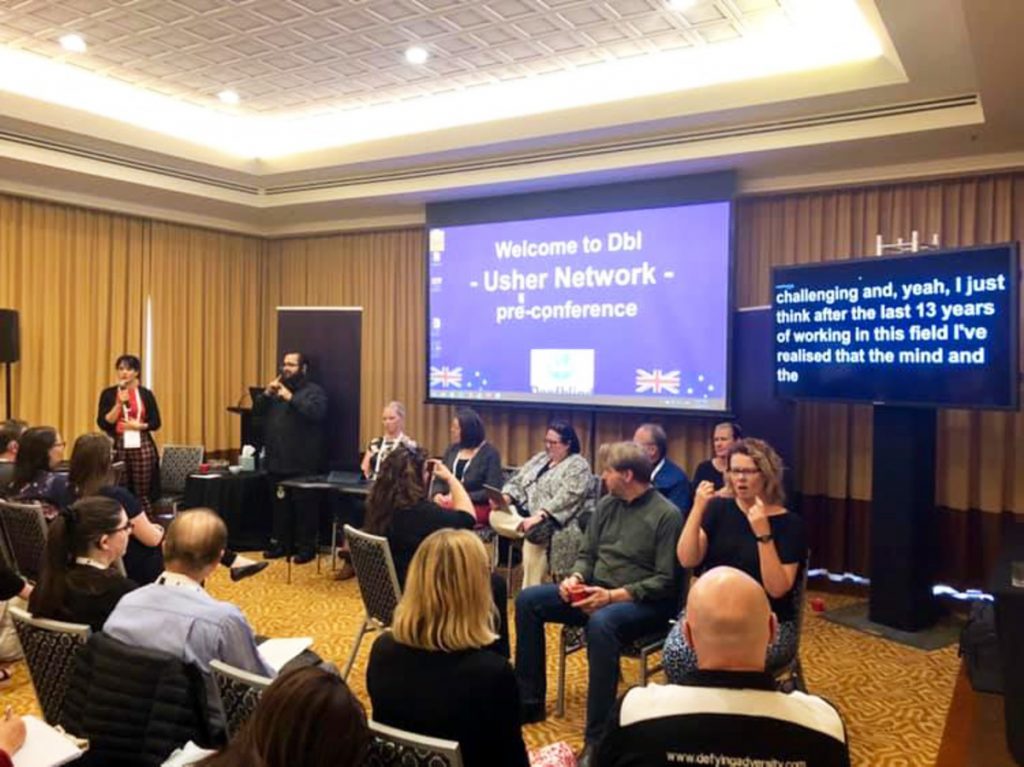Alana Roy provides psychological support to the Deaf and Deafblind community including those who have Usher Syndrome, and their families.
Usher Syndrome
It is an inherited, genetic condition with the main symptoms being hearing loss and sight loss due to a condition called retinis pigmentosa (RP). In some cases, even balance difficulties can occur.
Everyday life may be affected, from communicating with other people and listening in social situations to difficulties with tasks such as watching television or listening to the radio.
There are different types of hearing loss.
Sensorineural hearing loss is caused by damage to the hair cells and/or the auditory nerve in the ear. It can be congenital or acquired, and causes include ageing, illness, and exposure to loud sounds, prematurity and as part of a syndrome.
Conductive hearing loss is when sounds do not pass from your outer to inner ear. This can be due to a blockage, or due to a problem with the eardrum or bones in the ear. Some conductive hearing losses are permanent, whereas others can be treated or there are surgical options available.
A mixed hearing loss has both sensorineural and conductive elements.
Hearing loss can be challenging, but, with the right support, you can live a full, connected and meaningful life.
RP also causes night blindness and a loss of peripheral vision through the progressive degeneration of the retina. As RP progresses the field of vision narrows – a condition sometimes known as ‘tunnel vision’ – until only the ability to see straight ahead remains.
Usher type 1
There are three types of Usher syndrome.
People with Usher type 1 are usually born with profound hearing loss in both ears. Balance problems are also common. Babies may show delays in sitting and walking, and experience disorientation throughout their life, particularly as their sight changes.
A person’s primary communication method is typically British Sign Language (BSL), though this may change as their sight deteriorates.
Usher type 2
People who have Usher type 2 are usually born with a mild to severe hearing loss in both ears. This is typically within the higher frequency ranges. Type 2 is not associated with balance problems, which is a characteristic that distinguishes it from type 1.
A person’s primary communication method is usually speech, often assisted by hearing aids and lip-reading.
Usher type 3 is characterised by gradual sight and hearing loss, which occurs later in life after a person has learnt to speak. Some people may develop severe hearing loss while others may not.
People with Usher type 3 typically have problems with their balance. It’s common for people to be misdiagnosed as having type 1 if they demonstrate balance problems and severe hearing loss.
A person’s primary communication method is usually speech, often assisted by hearing aids and lip-reading.
Atypical Usher
Not everyone who has Usher syndrome fits into these three clinical types. People may have varying symptoms that are difficult to diagnose as a specific Usher type. Cases like this are called atypical.
There are many different formal and non-formal methods of communication, which we use to express our wants, thoughts, and feelings. These methods of communication help us make choices, make connections with others and allow us to control our lives.
Everyone is different and has a unique way of communicating. We need to make sure that everyone’s way of communicating is valued and responded to. It’s crucial that communication is clear, concise, accessible and right for you and the person you’re communicating with.
Below is a picture of me facilitating a Mental Health Panel at the Usher Conference Queensland 2019

We had
1) a Deafblind GP, Ph.D. student,
2) Deafblind pharmacist,
3) Deafblind medical doctor and researcher and
4) Deafblind teacher, advocate, and manager at Helen Keller (he knew 3 spoken languages, 3 written and 3 sign languages).
How did they achieve such success?
- By focusing on possibilities
- Accepting what you can’t change and harnessing energy for what you can do,
- Choosing to use their mind and body as their most powerful tool (as opposed to a prison sentence)
- Community
- Accessibility
- Connection
To find out more about how I can help, visit my deaf and deafblind counselling page.
For more information about Usher Syndrome see Usher Kids Australia
https://www.usherkidsaustralia.com
Usher Coalition
